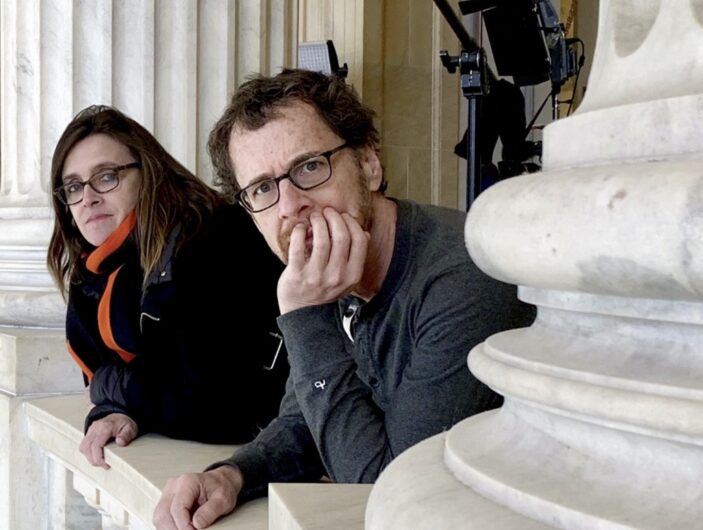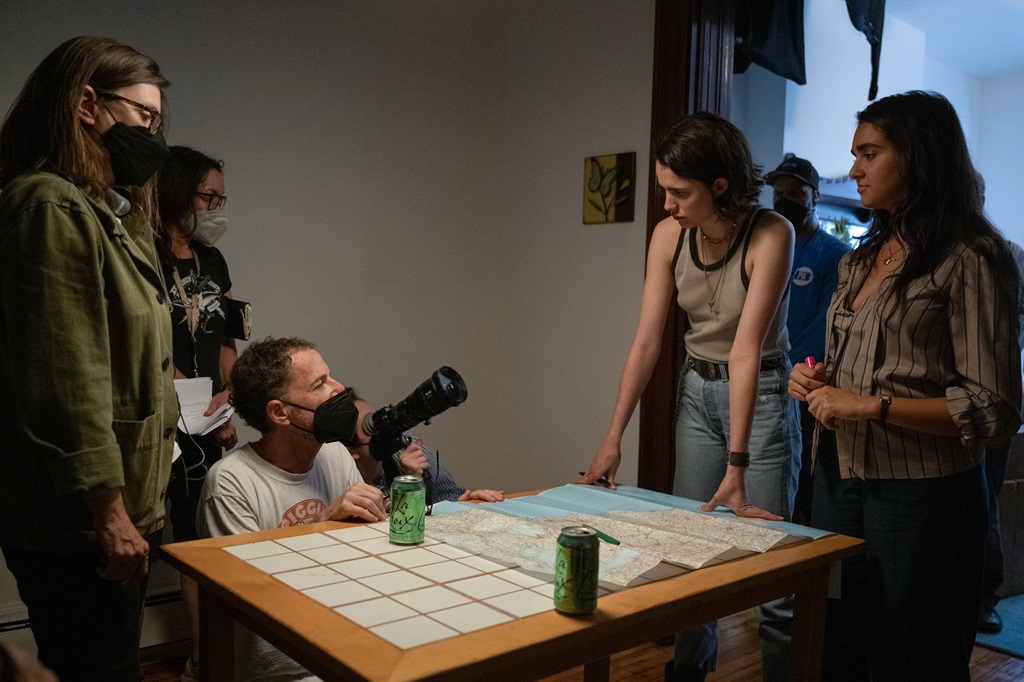
Of all the films to be shrouded in an air of secrecy, a lesbian road movie from a Coen Brother may not seem like the most obvious choice. But, indeed, Ethan Coen‘s Drive-Away Dolls, an original, queer-thinking comedy created with his wife, Tricia Cooke, basks in certain narrative (and visual) reveals that made for certain portions of their chat with Peter Gray to be left on the cutting room floor, so to speak.
What could be revealed in the chat was how this wild idea came to fruition – it seems we have a beat-up folk singer to thank? – and if there was anything originally created for the film that didn’t make the final edit.
Before I get to anything specific about Drive-Away Dolls, there’s an exchange early on in the film that very much tickled my fancy regarding Geraldine Viswanathan’s character and her disdain for the word “Anyhoo”, and it got me thinking, What’s your anyhoo? Is there any word that just doesn’t sit well with you?
Ethan Coen: Well, as you might guess…it’s anyhoo (laughs). Don’t get me started. There are so many! People talk about “Looking at something through a particular lens”, I fucking go berserk. What lens?
Tricia Cooke: I don’t think that’s the same though?
Ethan Coen: It’s kinda the same.
Tricia Cooke: It’s not.
Ethan Coen: What do you got?
Tricia Cooke: I’d have to think about it. What’s yours?
Mine is when people say “pacifically”, but they mean “specifically”. That grinds me so much.
Tricia Cooke: (Laughs) Yeah, it’s like someone saying “pamplet” when they mean “pamphlet”.
Ooh, hearing that would probably make my blood boil. But onto the film itself, to say this is wild would be an understatement. I loved that I knew nothing about it. I went into it blind. I didn’t know where it was going, and I highly suspect that no one will gather where it’s going either. Where did this idea originate from?
Ethan Coen: We don’t really outline, we just write as we go on the principle that if the writer doesn’t know where it’s going, the audience can’t possibly know either. It originated with (Tricia). It originated with the title, which Tricia came up with.
Tricia Cooke: Yeah, a friend of mine and I came up with the title. In a bar. In New York. And I came home and said “I came up with this great title for a road movie – Drive-Away Dykes.” We knew we wanted it to be a queer film. We had Cynthia Plaster Caster in there (laughs), and this briefcase, and what could possibly be in there.
Ethan Coen: It’s so strange to think what gets you started. Tricia came home and said “Drive-Away Dykes”, so I knew it had to be a kind of exploitation movie. And a road movie. But you only know that because of the title. I went into the office one day and Joel (Coen) said “Okay, there’s this movie that starts with Dave Van Ronk being beat up outside a folk club in New York City in the early 60s.” And I was like, “Wait a minute. Is that a movie?” Who the fuck would want to beat up a folk singer? So it just started…your mind just gets anchored by weird somethings.
Tricia Cooke: At least, on this movie, you come up with some characters and you just start writing scenes. One thing kinda leads to the next, and you’re like, “Okay, now these people can come in…”
Ethan Coen: If you have fun with the characters they can feel kind of alive. It’s easy to write them as they bring their world with them.

I saw an interview with Beanie Feldstein, where she mentioned that the original name of her character was Jennifer before it was changed to Sukie, which suits her so much better. Was there anything else that started off as one thing and became another to what we see on screen?
Tricia Cooke: When we wrote it initially it was a contemporary movie. Then we started writing it and in the 20-or-so years since, it became a period movie. But, aside from that?
Ethan Coen: The Beanie thing was just very specific. We just really liked Beanie when we met her. She’s so great. We liked her as a person and an actor. Hollywood can be a bit leery about making characters specifically ethnic, but when we met her and knew she was Jewish, it was like, “Oh, you’re not Jennifer Smith. You’re Sukie Schenkleman.”
Tricia Cooke: I think Beanie appreciated the name change.
And with the suitcase…the reveal of the contents…Without giving anything away, what’s that research process like? Is there a shopping expedition involved? Everything was so specific in that case. You committed to the bit. So you have to make sure it gets the pay-off it deserves.
Ethan Cooke: You really put your finger on the writing challenge. This stuff is supposed to be surprising, yet in retrospect, it’s inevitable. You have an endless discussion with the props team about their nature. This shit doesn’t just happen (laughs). People think it’s easy assembling all this.
Drive-Away Dolls is screening in Australian theatres from February 22nd, 2024.
